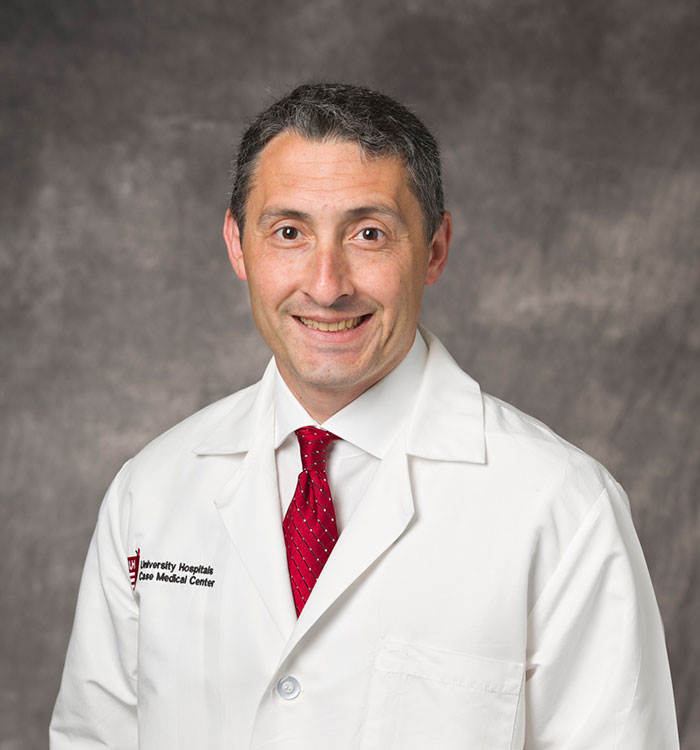Brain Aneurysm Treatment Boost
October 07, 2019
UH leads in patient recruitment for global REACT trial
Innovations in Neurology & Neurosurgery | Fall 2019
Twenty-seven percent of clinical research sites fail to enroll a single patient, according to a 2017 Tufts Center for the Study of Drug Development survey, and 30 percent of those patients who do enroll ultimately drop out.1 University Hospitals, however, is currently the highest enroller in the world for a large, complex study to assess a much-needed treatment for certain brain aneurysm patients.
 NIcholas C. Bambakidis, MD, FAHA, FAANS
NIcholas C. Bambakidis, MD, FAHA, FAANS Abhiskek Ray, MD
Abhiskek Ray, MDThe University Hospitals Neurological Institute is one of 100 sites worldwide participating in the REACT study. The prospective, multicenter, double-blind, randomized, placebo-controlled, parallel-group, Phase III study assesses the efficacy and safety of clazosentan in preventing clinical deterioration due to vasospasm-related delayed cerebral ischemia in adult patients with aneurysmal subarachnoid hemorrhage (aSAH).
A vasospasm, or constriction of brain arteries, is a complication that occurs five to 10 days after the aneurysm. The reduced blood flow caused by the vasospasm leads to worsening of a patient’s condition and possibly to a stroke. Previous studies suggest clazosentan may improve outcomes in patients who experience vasospasm or may possibly prevent the condition.
“The complication of delayed ischemia from vasospasm can be devastating, as most patients are relatively young,” says principal investigator Nicholas C. Bambakidis, MD, FAHA, FAANS, Director and Vice President, UH Neurological Institute, University Hospitals Cleveland Medical Center, and Professor of Neurological Surgery, Case Western Reserve University School of Medicine. “Current treatment isn’t always effective. This trial has the potential to bring groundbreaking treatment alternatives that can make a significant difference in these patients.”
Co-investigator Abhishek Ray, MD, Assistant Professor of Neurological Surgery for the School of Medicine, adds that there hasn’t been a new Food and Drug Administration-approved drug for cerebral vasospasm in 30 years. With improved understanding of clazosentan and the optimal treatment dose, the drug sponsor, Idorsia Pharmaceuticals Ltd., is moving ahead with recruitment. The company hopes to enroll 400 participants.
IT TAKES A VILLAGE
Not every strong research site has the ability to take on this study because of the staff, training and complexity involved. Clinicians evaluate participants every six hours for up to 12 weeks. Any staff member who performs neurological assessments undergoes extensive ongoing training to ensure patient safety and to make absolutely certain everyone follows site-specific procedures and a complex protocol throughout the study.
“To do this study correctly, we have to have a team effort,” says Dr. Ray. “We have to have residents, fellows, nurses and physicians on board, educated and on the same page.”
To help bring the team together for this study, Dr. Ray gave presentations at grand rounds and talks at conferences to educate residents and staff. “To follow the protocol, we have to put in serious effort,” he says.
UH Neurological Institute has the administrative and clinical support to participate in the REACT study. It also has a high volume of patients with aneurysmal subarachnoid hemorrhage, which made UH Cleveland Medical Center a potentially good fit.
The UH Neurological Institute’s reputation for quality outcomes in aneurysm, combined with the reputations of Drs. Bambakidis and Ray, helps generate a strong referral base. Those factors put UH Cleveland Medical Center among the sites worldwide that excel in patient recruitment for even the most resource-intensive studies.
To refer patients to the REACT study, contact Mary Andrews or Natalie Abraham at 216-553-1778.
1 New Tufts Research Explores Barriers to Clinical Trial Recruitment Success, Medical Marketing Insights; Poor Physician and Nurse Engagement Driving Low Patient Recruitment, Tufts CSDD Impact Reports, Jan/Feb, Vol. 19 No. 1.


